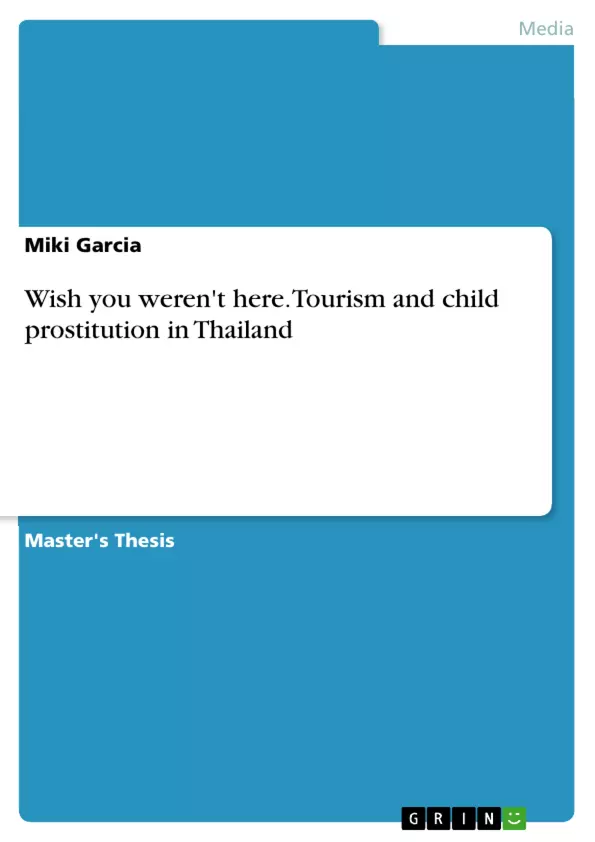I went to Thailand to investigate child sex tourism.
'Young girls in supply and the demand seems limitless. The commercial sexual exploitation of girls is a global, multi-billion dollar industry, pouring money into the hands of private citizens, tourists, governments and the police. No single approach, in a single country, can entirely solve the problem. '
This is a master's degree thesis. The first part consists of a journalistic project (i.e. feature article) and the second part includes the methodology and feedback of the project.
Table of Contents
- Preamble
- Chapter One: The Process
- Chapter Two: The Child Prostitution
- 2.1 Child Sex Tourism
- 2.2 Factors Behind the Rise of Prostitution
- Chapter Three: Conclusion
- Interviews
- References
- Acknowledgements
Objectives and Key Themes
This paper aims to explore the complex issue of child prostitution in Thailand, particularly focusing on its connection to the tourism industry. It investigates the mechanisms driving this exploitation, the factors contributing to its growth, and the ineffectiveness of current approaches to combat it.
- The link between tourism and the rise of child prostitution in Thailand.
- The economic and social factors contributing to the exploitation of children.
- The role of international and domestic law enforcement in addressing the issue.
- The profiles and motivations of individuals involved in child sex tourism.
- The challenges in combating this global problem.
Chapter Summaries
Chapter One: The Process: This chapter delves into the mechanics of child sex tourism in Thailand, detailing how the industry operates and the various actors involved. It highlights the role of travel agencies, bars, and hotels in facilitating the exploitation, showcasing how seemingly legitimate businesses contribute to the problem. The chapter emphasizes the ease with which tourists can access child prostitutes, underscoring the lack of effective regulation and enforcement. It introduces the concept of both systematic and opportunistic abusers and emphasizes how tourism provides both the opportunity and the circumstances that enable the abuse to occur.
Chapter Two: The Child Prostitution: This chapter provides a detailed analysis of the child prostitution industry itself. It examines the significant increase in child prostitution despite an overall decrease in the number of adult prostitutes, linking this to the economic downturn in Asia. The chapter explores the factors contributing to this rise, including the increasing affordability of children due to economic hardship and the proactive creation of supply to meet tourist demand. The chapter also delves into the deceptive marketing strategies employed by some travel agencies, promoting Thailand as a place where sexual access to children is easily available, and the role of the internet in facilitating the spread of information and contacts amongst perpetrators.
Keywords
Child prostitution, sex tourism, Thailand, tourism industry, child exploitation, economic factors, law enforcement, paedophilia, international crime, ECPAT, UNICEF.
Frequently Asked Questions: A Comprehensive Language Preview on Child Prostitution in Thailand
What is the main topic of this document?
This document provides a comprehensive overview of child prostitution in Thailand, specifically focusing on its connection to the tourism industry. It analyzes the mechanisms of exploitation, contributing factors, and the shortcomings of current countermeasures.
What are the key themes explored in the document?
The key themes include the link between tourism and the rise of child prostitution, the economic and social factors contributing to child exploitation, the role of law enforcement, the profiles of those involved in child sex tourism, and the challenges in combating this global issue.
What does the document cover in Chapter One?
Chapter One details the mechanics of child sex tourism in Thailand, outlining how the industry operates and the roles of various actors, including travel agencies, bars, and hotels. It highlights the ease of access to child prostitutes and the lack of effective regulation and enforcement. The chapter distinguishes between systematic and opportunistic abusers and the role of tourism in facilitating the abuse.
What is discussed in Chapter Two?
Chapter Two analyzes the child prostitution industry itself, explaining the increase in child prostitution despite a decrease in adult prostitution, linking this to the economic downturn in Asia. It explores contributing factors like the affordability of children due to economic hardship and the creation of supply to meet tourist demand. The chapter also addresses deceptive marketing strategies by travel agencies and the internet's role in facilitating the spread of information among perpetrators.
What is the overall objective of this research?
The paper aims to explore the complex issue of child prostitution in Thailand, particularly its connection to the tourism industry. It investigates the mechanisms driving this exploitation, factors contributing to its growth, and the ineffectiveness of current approaches to combat it.
What are the key words associated with this research?
Key words include: Child prostitution, sex tourism, Thailand, tourism industry, child exploitation, economic factors, law enforcement, paedophilia, international crime, ECPAT, UNICEF.
What other information does this preview contain?
Besides the chapter summaries and key themes, this preview includes a table of contents, a list of objectives, and a list of keywords. It also mentions the inclusion of interviews and references in the complete document.
What is the intended audience of this document?
The document is intended for academic use, allowing for the structured and professional analysis of themes related to child prostitution in Thailand.
- Citar trabajo
- Miki Garcia (Autor), 1998, Wish you weren't here. Tourism and child prostitution in Thailand, Múnich, GRIN Verlag, https://www.grin.com/document/491026



